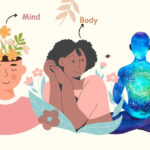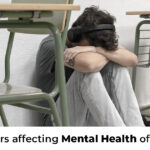Young adults may face a variety of mental health issues such as depression, anxiety, stress, and substance abuse. They may also struggle with issues related to identity and self-esteem, as well as relationship difficulties.
Some common sources of stress for this population include:
Academic pressure:
Young adults may feel pressure to excel in their studies and achieve high grades which can have a severe impact on the mental health of young growing adults. Somewhere unknowingly we do create havoc on the minds of our children, which causes them to believe that marks play a crucial role in everything in life.
Physical appearance:
Teenagers often face pressure related to their appearance, including concerns about body image, and feeling self-conscious about their weight, height, or body shape. They believe they have to conform to social beauty standards, and experience anxiety or low self-esteem as a result of these concerns.
Social media:
The constant access to social media and the pressure to present a perfect image online can lead to feelings of inadequacy and being left out. They want to belong to that make-believe world and that competition causes more harm than good.
Relationship difficulties:
Young adults may also experience stress related to dating and maintaining peer pressure of socializing, particularly in the context of today’s dating culture, which has become a new norm for very young people.
It is important to recognize that these stressors are faced by many, more than we are ready to admit, young adults. Each one of them is fighting a battle within them, and it has become a social stigma. It’s important to remember that every person, whether young or adult is unique, and what works for one person may not work for another, so it’s important to be open to trying different strategies and approaches, what can take a backseat till they grow and what should be prioritized.
Some strategies that may be effective include:
- Encourage them to seek professional help like therapy or counseling to work through their stressors and improve their mental health.
- Help them to identify and build on their strengths, talents, and opportunities to use these in positive ways.
- Make them understand that as a student what’s more important in their life like studies along with physical exercise. Social media and beauty can take a backseat for a while.
- Provide stress management resources, and introduce them to the world of meditation, deep breathing, and yoga. Any form of physical activity can soothe and calm their brain and increase their focus span.
- Encouraging healthy lifestyle choices at a younger age, like eating well, getting enough sleep, and maintaining a well-planned schedule, will help them later in life too.
- Encourage young adults to build a strong support network of family, friends, and peers and maintain open and honest communication. Encourage them to talk about their thoughts and feelings. Listen to them and validate their experiences.
- Educate them that it’s okay to feel stressed, and anxious at times and that seeking help is not a sign of weakness
“Mental health is just as important as physical health, yet it often goes overlooked and stigmatized. It’s time to break the silence and start a conversation about mental health.”







